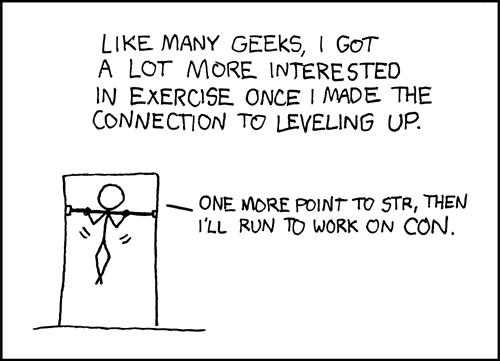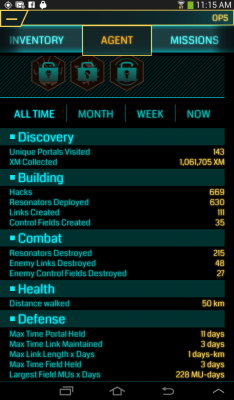Anybody who follows me knows that I’m all about fitness, gamification, and especially the intersection of fitness and gamification. Add to that a bit of program design, and I’m already patient zero for @TheBioneer’s latest video, even before thinking about larping.
Tag: games
Gamifying exercise: motivating AND appalling
There’s a good Oliver Burkeman piece in the Guardian on gamification, or what Jane McGonigal calls living gamefully: using “the same psychological principles, featuring mini-challenges, systems for winning points, completing quests and moving upwards through levels,” to motivate people to do ordinary real-world stuff like exercise or go to work. Burkeman suggests that gamification “reliably divides people into those energized by it and those utterly appalled,” so I wanted to call myself out as an exception, because I’m both.
First of all, I’m totally in the target audience for this sort of thing. I remember seeing this comic in 2006, back when I was still working a regular job, and finding it spoke deeply to me.

I bought both Zombies, Run! and Superhero Workout by Six to Start, two games that gamify exercise. I found myself strongly motivated to get out and run, even in winter cold, by the story in Zombies, Run!
More recently, I’ve observed myself strangely motivated by Google Fit. Even though my goal is self-set, and the reward for achieving it is merely a splash of orange lines and a “bling” sound, I have been known to nip out in the late evening to walk another six minutes just to get my walking time for the day up to my 90-minute goal.
I would pay serious money for a more clever version of Google Fit—one that could count not only time and distance walking, running, and bicycling, but also keep track of my crawling, hanging, climbing, jumping, balancing, throwing & catching, lifting & carrying, swimming & diving, and grappling & striking.
On the other hand, I recognize that this is fundamentally an error—the same error I talked about just a few days ago, when I explained that, although it’s in my nature to want to figure out what I need and make a plan to get it, I recognize that it’s a mistake. It’s a mistake because the “figuring it out” step is both impossible (intractably complex) and unnecessary (get ample natural movement and you’ll be fine).
And yet . . . . And yet, it is a fact that my life does not have enough natural movement in it. Given that I’m not going to become a hunter-gatherer (and would probably starve to death in a few months, if I didn’t die sooner from exposure or an accident), perhaps “living gamefully” is useful as a way to motivate myself and to keep track of the exercise I need to replace the movement I’m not getting.
Playing Ingress (now in open beta!)

For about six weeks now, I’ve been playing Ingress.
It’s a game. You could almost call it a video game—you see what’s happening on a video screen—but to play you have to go outside: The action of the game happens at specific places in the real world.
The conceit of the game is that matter from another dimension is intruding into our world via portals. In our world, these portals appear as works of public art or unique architecture. Via the game (running on an Android phone or tablet), you can locate and manipulate these portals.
I’ve been having a great time. I’m working with a half-dozen or so local Resistance players, some new like me, others already at level 8 and mainly providing support (since they’re no longer working to level up themselves).
The structure of the game encourages team play—building a powerful portal requires multiple high-level players to work together. But the team play doesn’t need to be simultaneous, just somewhat coordinated. Lower-level players can make faster progress if they play with a higher-level player, but it’s not necessary.
 Besides the pleasures of loosely integrated, minimal-pressure teamwork, the other great thing about the game is that, because it takes place in the real world, to play it you have to go out in the real world. The game reports on how far you’ve walked in the course of playing it—for me, 50 km in the past six weeks. (See “Distance walked” in screenshot.) I credit that walking with helping me maintain my weight even though I haven’t been able to run for the past month.
Besides the pleasures of loosely integrated, minimal-pressure teamwork, the other great thing about the game is that, because it takes place in the real world, to play it you have to go out in the real world. The game reports on how far you’ve walked in the course of playing it—for me, 50 km in the past six weeks. (See “Distance walked” in screenshot.) I credit that walking with helping me maintain my weight even though I haven’t been able to run for the past month.
I’m also really into the public art aspect of the game. I was already a huge fan of public art, but the game has made me connect with individual works in a way that I hadn’t. I’m aware of individual pieces in a whole new way—how they relate in space with one another and with other aspects of the community. (Although it is a different experience now to go for a walk downtown. Even when I’m not playing, I’m aware that certain works that are portals in the game. I have to remember that most people are not.)
Anyway, Ingress is now in open beta. If you have an Android device, you can just download the game and go.
I recommend it.
If you’re local and play, get in touch. I’d be glad to help you level up.
